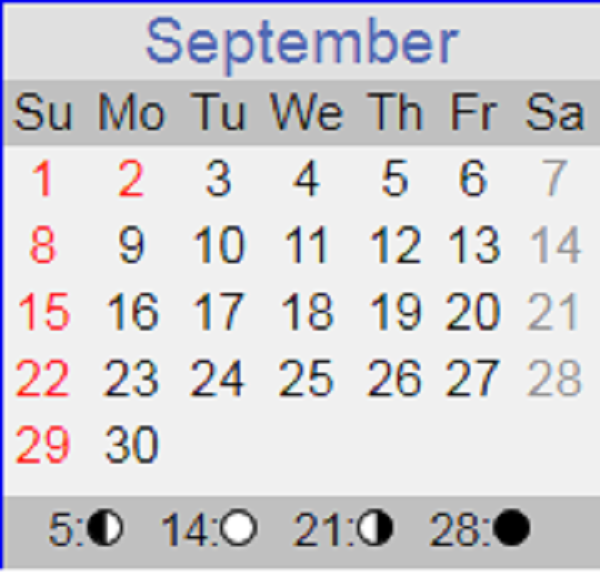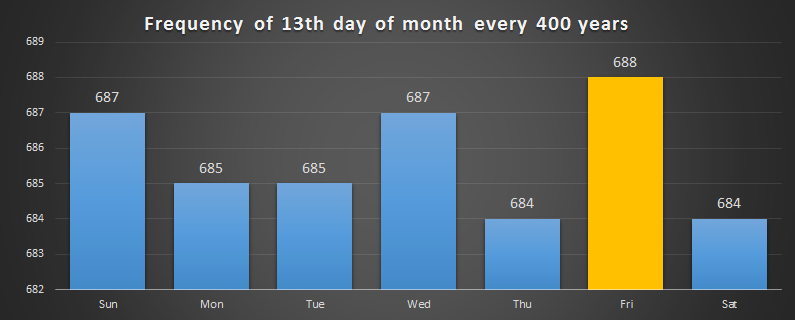

Image via les affaires.
Friday, December 13, 2019, gives us the second two Friday the 13ths this year. Exactly 13 weeks previous to this Friday the 13th, we had our first Friday the 13th on Friday, September 13, 2019. Unusual? Not particularly. Any calendar year has at least one Friday the 13th, and can have as many as three Friday the 13ths. Not that we at EarthSky suffer from friggatriskaidekaphobia – an irrational fear of Friday the 13th – but, gosh darn, the next Friday the 13th happens exactly 13 weeks after today’s Friday the 13th – coming on March 13, 2020.
Yikes, these few coincidences involving the number 13 are only the tip of the iceberg. We could cite more …
Keep reading to investigate the intriguing mathematics behind Friday the 13th and the calendar.
The last time we had only one Friday the 13th in a calendar year was in May 2016 and the next time won’t be until August 2021. Three Friday the 13ths last took place in 2015 (February, March, November), and will next happen in 2026 (February, March, November).
Read more: This year’s Harvest Moon on Friday, September 13, 2019

Gioachino Rossini, a 19th century Italian composer. Folklorists say there's no written evidence that Friday the 13th was considered unlucky before the 19th century. The earliest known documented reference in English appears to be in Henry Sutherland Edwards' 1869 biography of Rossini.
Are all these Friday the 13ths a super coincidence? Super unlucky? Neither. They’re just a quirk of our calendar.
According to folklorists, there’s no written evidence that Friday the 13th was considered unlucky before the 19th century. The earliest known documented reference in English appears to be in Henry Sutherland Edwards’ 1869 biography of Gioachino Rossini.
Still, Friday has always gotten a bad rap. In the Middle Ages, people would not marry – or set out on a journey – on a Friday.
There are also some links between Christianity and an ill association with either Fridays or the number 13. Jesus was said to be crucified on a Friday. Seating 13 people at a table was seen as bad luck because Judas Iscariot, the disciple who betrayed Jesus, is said to have been the 13th guest at the Last Supper. Meanwhile, our word for Friday comes from Frigga, an ancient Scandinavian fertility and love goddess. Christians called Frigga a witch and Friday the Witches’ Sabbath.
In modern times, the slasher-movie franchise “Friday the 13th” has helped keep friggatriskaidekaphobia alive.

The Friday the 13th slasher-movie franchise helped this day maintain its notoriety. Image via Wikimedia Commons.
We have two Friday the 13ths in 2019 – in September and December – because 2019 is a common year (not a leap year) that started on a Tuesday. Whenever a common year of 365 days starts on a Tuesday, it’s inevitable that the months of September and December will start on a Sunday. And any month starting on a Sunday will have a Friday the 13th.
The last time a common year started on a Tuesday was six years ago, in the year 2013, and the next time will be 11 years from 2019, in 2030.
In addition, when any leap year of 366 days begins on a Monday, there are Friday the 13ths in September and December, as well. This September-December Friday the 13th leap year will take place five years from now, in 2024.
Some of you may wonder if there’s some formula that governs how the Friday the 13th drama repeats itself. The answer is yes! Keep in mind that a twofold September-December Friday the 13th year can only happen during a common year of 365 days, when January 1 falls on a Tuesday – or in a leap year of 366 days, when January 1 falls on a Monday. Let the intriguing number play begin …
The first twofold September-December Friday the 13th year in the 21st century (2001 to 2100) occurred in 2002, which is two years after a leap year. Any calendar year happening two years after a leap year will have days and dates matching up again in periods of 11, 17 and 28 years:
2002 + 11 = 2013
2002 + 17 = 2019
2002 + 28 = 2030

September 2019 calendar via TimeandDate.
How often do September-December Friday the 13ths happen? More often than you might imagine! We continue the cycle onward to find a grand total of 11 September-December Friday the 13th 365-day common years for the 21st century (2001 to 2100):
2002, 2013, 2019, 2030, 2041, 2047, 2058, 2069, 2075, 2086 and 2097
In the 21st century (2001 to 2100), the first September-December Friday the 13th leap year of 366 days occurs in 2024. This September-December Friday the 13th leap year recurs in cycles of 28 years:
2024 + 28 = 2052
2052 + 28 = 2080
So we find a total of three September-December Friday the 13th leap years in the 21st century (2001 to 2100): 2024, 2052 and 2080.

Statistically speaking … the modal day for the 13th to occur on is Friday, with 688 occurrences in the 4,800-month cycle. (Of course, this is the same graph for the 6th as well as the 13th, 20th and 27th.) Caption and graphic via datagenetics.com.
Rhyme and reason for the 400-year Friday the 13th cycle.
Because the Gregorian calendar has a 400-year cycle, these twofold September-December Friday the 13th years recur in cycles of 400 years. For example, respective September-December Friday the 13th calendar years are exactly 400 years apart in the 21st and 25th centuries:
21st century (2001 to 2100):
2002, 2013, 2019, 2024 (leap year), 2030, 2041, 2047, 2052 (leap year), 2058, 2069, 2075, 2080 (leap year), 2086 and 2097
25th century (2401 to 2500):
2402, 2413, 2419, 2424 (leap year), 2430, 2441, 2447, 2452 (leap year), 2458, 2469, 2475, 2480 (leap year), 2486 and 2497
How about in other centuries? If you’re up for doing the computations:
22nd century (2101 to 2200): the first common year September-December Friday the 13th happens in 2109, and repeats in cycles of 6, 17 and 28 years. The first leap year September-December Friday the 13th happens in 2120 and recurs every 28 years.
23rd century (2201 to 2300): the first common September-December Friday the 13th year happens in 2205, and repeats every 6, 17 and 28 years. The first leap year September-December Friday the 13th happens in 2216 – but, by Gregorian calendar rules, the year 2300 is not a leap year.
24th century (2301 to 2400): the first common September-December Friday the 13th year happens in 2301, with the days and dates matching up again in periods of 6, 17 and 28 years. The first leap year September-December Friday the 13th happens in 2216.
Read more: A year with 13 Friday the 13ths?
As magical as all of this Friday the 13th calendar intrigue appears to be, it’s not supernatural. It’s entertaining number play, even if it may haunt our uncomprehending minds.

“… and whether or not it is clear to you, the universe is unfolding as it should.” Resin, acrylic paint and archival print on transparency on panel, by Boston artist Jessica Dunegan.
Bottom line: September 13, 2019, presents the first Friday the 13th in 2019. Then, exactly 13 weeks after that, 2019’s second Friday the 13th falls in December.
from EarthSky https://ift.tt/2PyeABK


Image via les affaires.
Friday, December 13, 2019, gives us the second two Friday the 13ths this year. Exactly 13 weeks previous to this Friday the 13th, we had our first Friday the 13th on Friday, September 13, 2019. Unusual? Not particularly. Any calendar year has at least one Friday the 13th, and can have as many as three Friday the 13ths. Not that we at EarthSky suffer from friggatriskaidekaphobia – an irrational fear of Friday the 13th – but, gosh darn, the next Friday the 13th happens exactly 13 weeks after today’s Friday the 13th – coming on March 13, 2020.
Yikes, these few coincidences involving the number 13 are only the tip of the iceberg. We could cite more …
Keep reading to investigate the intriguing mathematics behind Friday the 13th and the calendar.
The last time we had only one Friday the 13th in a calendar year was in May 2016 and the next time won’t be until August 2021. Three Friday the 13ths last took place in 2015 (February, March, November), and will next happen in 2026 (February, March, November).
Read more: This year’s Harvest Moon on Friday, September 13, 2019

Gioachino Rossini, a 19th century Italian composer. Folklorists say there's no written evidence that Friday the 13th was considered unlucky before the 19th century. The earliest known documented reference in English appears to be in Henry Sutherland Edwards' 1869 biography of Rossini.
Are all these Friday the 13ths a super coincidence? Super unlucky? Neither. They’re just a quirk of our calendar.
According to folklorists, there’s no written evidence that Friday the 13th was considered unlucky before the 19th century. The earliest known documented reference in English appears to be in Henry Sutherland Edwards’ 1869 biography of Gioachino Rossini.
Still, Friday has always gotten a bad rap. In the Middle Ages, people would not marry – or set out on a journey – on a Friday.
There are also some links between Christianity and an ill association with either Fridays or the number 13. Jesus was said to be crucified on a Friday. Seating 13 people at a table was seen as bad luck because Judas Iscariot, the disciple who betrayed Jesus, is said to have been the 13th guest at the Last Supper. Meanwhile, our word for Friday comes from Frigga, an ancient Scandinavian fertility and love goddess. Christians called Frigga a witch and Friday the Witches’ Sabbath.
In modern times, the slasher-movie franchise “Friday the 13th” has helped keep friggatriskaidekaphobia alive.

The Friday the 13th slasher-movie franchise helped this day maintain its notoriety. Image via Wikimedia Commons.
We have two Friday the 13ths in 2019 – in September and December – because 2019 is a common year (not a leap year) that started on a Tuesday. Whenever a common year of 365 days starts on a Tuesday, it’s inevitable that the months of September and December will start on a Sunday. And any month starting on a Sunday will have a Friday the 13th.
The last time a common year started on a Tuesday was six years ago, in the year 2013, and the next time will be 11 years from 2019, in 2030.
In addition, when any leap year of 366 days begins on a Monday, there are Friday the 13ths in September and December, as well. This September-December Friday the 13th leap year will take place five years from now, in 2024.
Some of you may wonder if there’s some formula that governs how the Friday the 13th drama repeats itself. The answer is yes! Keep in mind that a twofold September-December Friday the 13th year can only happen during a common year of 365 days, when January 1 falls on a Tuesday – or in a leap year of 366 days, when January 1 falls on a Monday. Let the intriguing number play begin …
The first twofold September-December Friday the 13th year in the 21st century (2001 to 2100) occurred in 2002, which is two years after a leap year. Any calendar year happening two years after a leap year will have days and dates matching up again in periods of 11, 17 and 28 years:
2002 + 11 = 2013
2002 + 17 = 2019
2002 + 28 = 2030

September 2019 calendar via TimeandDate.
How often do September-December Friday the 13ths happen? More often than you might imagine! We continue the cycle onward to find a grand total of 11 September-December Friday the 13th 365-day common years for the 21st century (2001 to 2100):
2002, 2013, 2019, 2030, 2041, 2047, 2058, 2069, 2075, 2086 and 2097
In the 21st century (2001 to 2100), the first September-December Friday the 13th leap year of 366 days occurs in 2024. This September-December Friday the 13th leap year recurs in cycles of 28 years:
2024 + 28 = 2052
2052 + 28 = 2080
So we find a total of three September-December Friday the 13th leap years in the 21st century (2001 to 2100): 2024, 2052 and 2080.

Statistically speaking … the modal day for the 13th to occur on is Friday, with 688 occurrences in the 4,800-month cycle. (Of course, this is the same graph for the 6th as well as the 13th, 20th and 27th.) Caption and graphic via datagenetics.com.
Rhyme and reason for the 400-year Friday the 13th cycle.
Because the Gregorian calendar has a 400-year cycle, these twofold September-December Friday the 13th years recur in cycles of 400 years. For example, respective September-December Friday the 13th calendar years are exactly 400 years apart in the 21st and 25th centuries:
21st century (2001 to 2100):
2002, 2013, 2019, 2024 (leap year), 2030, 2041, 2047, 2052 (leap year), 2058, 2069, 2075, 2080 (leap year), 2086 and 2097
25th century (2401 to 2500):
2402, 2413, 2419, 2424 (leap year), 2430, 2441, 2447, 2452 (leap year), 2458, 2469, 2475, 2480 (leap year), 2486 and 2497
How about in other centuries? If you’re up for doing the computations:
22nd century (2101 to 2200): the first common year September-December Friday the 13th happens in 2109, and repeats in cycles of 6, 17 and 28 years. The first leap year September-December Friday the 13th happens in 2120 and recurs every 28 years.
23rd century (2201 to 2300): the first common September-December Friday the 13th year happens in 2205, and repeats every 6, 17 and 28 years. The first leap year September-December Friday the 13th happens in 2216 – but, by Gregorian calendar rules, the year 2300 is not a leap year.
24th century (2301 to 2400): the first common September-December Friday the 13th year happens in 2301, with the days and dates matching up again in periods of 6, 17 and 28 years. The first leap year September-December Friday the 13th happens in 2216.
Read more: A year with 13 Friday the 13ths?
As magical as all of this Friday the 13th calendar intrigue appears to be, it’s not supernatural. It’s entertaining number play, even if it may haunt our uncomprehending minds.

“… and whether or not it is clear to you, the universe is unfolding as it should.” Resin, acrylic paint and archival print on transparency on panel, by Boston artist Jessica Dunegan.
Bottom line: September 13, 2019, presents the first Friday the 13th in 2019. Then, exactly 13 weeks after that, 2019’s second Friday the 13th falls in December.
from EarthSky https://ift.tt/2PyeABK

Aucun commentaire:
Enregistrer un commentaire